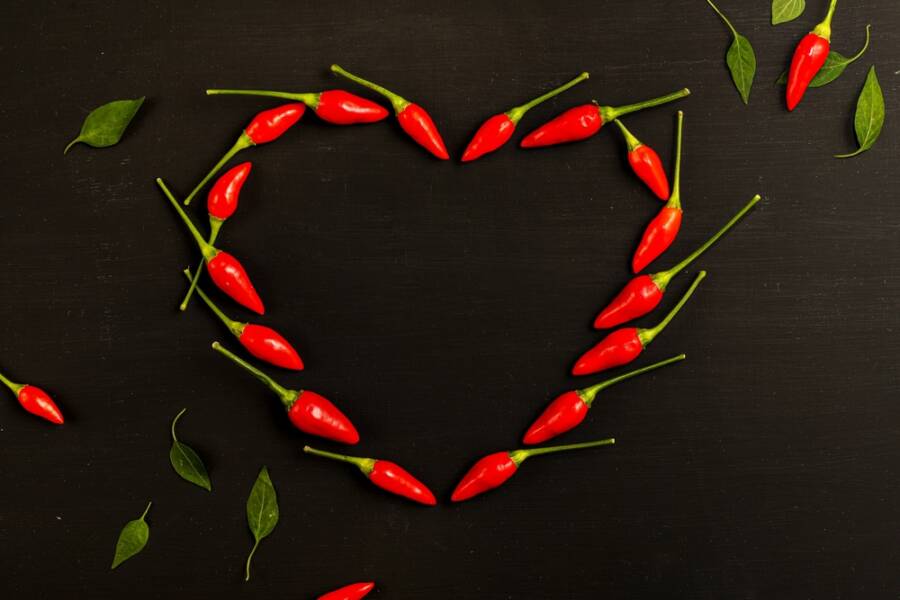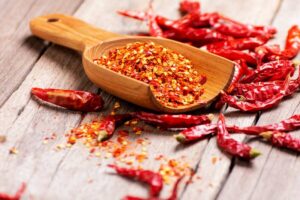When is spicy too spicy? And how can spicy food impact your health?
For those who aren’t used to eating spicy foods, even Louisiana hot sauce stings their tongue. And we can’t exactly blame them either! But what if we told you that spicy food can impact your health in a great way? Would you try to add a little spice to your life?
Spicy food ingredients have the potential to lower blood pressure, aid in weight loss, and lengthen life. However, only some enjoy spicy cuisine, particularly if they have stomach problems.
It’s crucial to gradually increase your consumption of spicy meals to reduce any potential negative consequences, especially if you’re not used to the spiciness.

Spicy foods increase healthy blood circulation
Are you still afraid to add a bit of spiciness to your meals? Well, you should, because, in addition to increasing sweating and making you feel more refreshed during the summer, spicy meals can also boost blood circulation.
Your body starts to sweat as soon as it senses the heat from the spicy meal; ultimately, the perspiration vanishes and cools your skin. Instead of eating ice cream to cool down, try some hot sauce.
It helps you lose weight faster
Because capsaicin slows down the upper gastrointestinal tract’s digestion, it may make you feel fuller and cause you to consume fewer calories overall. Spicy food intake may help with weight control, according to several human studies, by enhancing the composition of the gut microbiota, lowering hunger, and raising metabolism and fat burn.
Moreover, everyone who experimented with increasing the amount of spicy items in their diet reported that the capsaicin reduced their hunger. Of course, no spice will help you lose weight if you’re not making any changes to your diet and adding a regular workout schedule.
Spicy foods improve longevity
While eating an apple a day keeps the doctor away, eating chili peppers will add years to your life! The anti-inflammatory and antioxidant properties of capsaicin might be the cause of this. Researchers discovered that regular eaters of spicy meals had a 12% lower risk of all-cause death than those who preferred their food non-spicy.
Did you get a sweet tooth? Spicy foods can help
Do you have a constant urge to munch on something half an hour after you had dinner? Then consider adding a bit of spiciness to your meals. While you don’t need to overdo it by consuming an entire bottle of habanero sauce, consider putting paprika or chili flakes on top of your meat and vegetables.
Capsaicin found in spicy foods may also help with satiety, according to certain research. Therefore, after stuffing oneself with a spicy supper, there could be less of a desire for anything sweet.
May improve your heart health
While reading these lines, you find out that spicy foods help you increase blood circulation, improve longevity, and aid in your weight loss journey, but did you know that spices also take care of your heart health?
According to a recent study, consuming spicy food daily lowers your chance of dying from stroke or heart disease. While there isn’t 100% certainty that eating spicy food improves heart health, there appears to be a link between frequent consumption of spicy food and lower death rates.
Reduction of LDL, the nasty cholesterol kind that causes heart disease, is mostly to “blame” for the better cholesterol values.

Improves gut health
Not everybody can indeed tolerate spicy foods, especially because they can cause digestive issues. However, doctors recommend eating something a bit spicy so your gut can benefit from it. The microbiome that lives in our stomachs is essential to our health.
Diabetes and other metabolic and gastrointestinal illnesses, including irritable bowel syndrome (IBS), have been linked to an imbalance of bacteria in the gut. Studies indicate that capsaicin may enhance intestinal health by supplementing the quantity of beneficial bacteria in the gut while diminishing the number of germs that cause illnesses.
How can you increase your tolerance for spicy foods?
Besides having a ton of health benefits from eating spicy foods, you can also have some potential downsides. So it’s better to ask your doctor if it’s ok for you to eat spicy food or how spicy is too spicy for you.
Are you willing to try adding some spiciness to your dishes, but you don’t know how to do it without burning both your mouth, palate, and stomach? Start super slowly. This gives those who are new to the heat an opportunity to take a step back and make sure that eating spicy food isn’t making them sick to their stomach. Here are a couple of hot foods and tips to add more heat to your meals:
-
Increase the heat step by step
Start with peppers that have less capsaicin, such as Anaheim or poblano. Increase the amount of spicier spices or peppers gradually when you feel like your taste buds have adapted to your current degree of heat.
-
Try out chili oil
If peppers aren’t your favorites, you can always try out some chili oil. This type of oil is pepper-infused, and it can be very spicy too. To make sure you won’t end up throwing it because it’s way too spicy for your buds, read the label and see the level of spiciness indicated there. However, if you decide to try it, use it for eggs, vegetables, and meals from Asian and Greek cuisine, as well as for easy summer salads.
-
Pickled veggies
Another way to eat more spicy foods is by consuming pickled veggies like jalapeno or pickled onions. Side it with some grilled meat of your choice, or add it to your sandwiches. Besides the great taste, it will also be super healthy.
-
Kimchi
If you’re a fan of Asian cuisine, then you’re going to love kimchi too. A popular spicy Korean side dish prepared from fermented vegetables is called kimchi. You may eat it with rice, noodles, soup, and more, whether you make it at home or buy it at Asian stores.
-
Try to eat hot meals more often
There’s no joke, but your tongue will become used to the taste of spicy food the more of it you consume.
-
Have a glass of milk on hand
Why milk and not a fizzy drink, for example? Because the best choice to reduce the burn from capsaicin is from a beverage that contains both fat and protein. If you’re lactose intolerant, try any vegan milk available or fruit juice, but not orange or grapefruit.
After reading all these health benefits of eating spicy foods, have you decided to add some flavor to your meals? Try out Melinda’s Mango Habanero Hot Sauce, a sweet and mild hot sauce. It’s perfect for those who like spicy but not too spicy. Plus, it’s super affordable! Only $9.90.
Or you’re feeling adventurous and you like your meals hot and spicy as hell? Then you might be tempted to buy this hot sauce variety pack of four that includes the classic tabasco, the one with jalapeno, the habanero, and the cayenne. It can be found on Amazon for the bargain price of just $14.99.
You don’t know what recipes are both spicy and healthy? Oh, we got you! Here at Nutrition in the USA, we have everything you need (nutritionists approved) regarding this topic. So before closing the page, you may also want to check out 6 Dishes That Will Satisfy Your Spicy Curiosity.








1 thought on “How Can Spicy Food Impact Your Health?”
LOVED this article because I LOVE spicy foods.